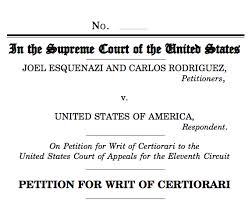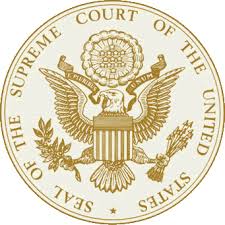Knowing When to Fold — Arguing the FCPA’s Definition of “Foreign Official”
 With lots of fanfare, Esquenazi and Rodriguez, and the usual suspects filed a cert petition and briefs in support of the appeal from the 11th Circuit Court of Appeals’ decision affirming the lower court’s interpretation of “instrumentality,” and the significant criminal sentences handed out to the two defendants.
With lots of fanfare, Esquenazi and Rodriguez, and the usual suspects filed a cert petition and briefs in support of the appeal from the 11th Circuit Court of Appeals’ decision affirming the lower court’s interpretation of “instrumentality,” and the significant criminal sentences handed out to the two defendants.
The petition was denied quickly. No one should have been surprised, including all the usual suspects. I do not want to rain on everyone’s parade but the Justice Department has been winning, and consistently so, for years on this issue. To put it simply, they have the better argument.
Contrary to the views of my respected colleague, the FCPA Professor, the term “instrumentality” has a separate meaning and rightfully covers enterprises that are state-owned (or controlled). DOJ persuaded three district court judges and one court of appeals, and has not lost yet.
The two defendants had to argue this issue. Frankly, it is interesting to consider whether they may have won on some of the sentencing issues if they were not carrying this “instrumentality” issue on their backs.
Aside from the two defendants, however, who have to appeal and have to raise these issues, the gaggle of other supporters on the “instrumentality” issue are tilting at windmills.
The issue is very basic – the term “instrumentality” has to mean something or Congress was legislating in an absurd manner (which may be possible, especially when I consider how we drafted some laws during my Congressional career). The term has to mean something and opponents have never answered that simple and basic question. Instead they point to other legislative measures, the absence of an affirmative statement in the legislative history, and unsupported claims of unfair interpretations.
 DOJ’s arguments on this issue have always been solid. The opponents use slippery tactics to obfuscate basic statutory interpretation maxims.
DOJ’s arguments on this issue have always been solid. The opponents use slippery tactics to obfuscate basic statutory interpretation maxims.
Wholly apart from the issue of statutory explanations, the cert petition presented no compelling reason for the Supreme Court to get involved in this debate. We have only one Circuit Court decision, and three district court decisions, all with similar interpretations and rulings. There is no Circuit split on this issue and the absence of this factor undermined any reason for the Supreme Court to get involved.
Finally, while no one will admit the importance of politics as a factor, no one is willing to take on the cause of restricting an otherwise broad statute aimed at reducing the occurrence of foreign bribery. While some may say that DOJ and the SEC have stretched the FCPA beyond its intended purpose, there is no track record of victims of aggressive prosecutions or examples of injustice.
 The FCPA is not as vague as critics like to claim. The message is very simple – do not bribe. Companies and executives know what it means and they know what they are prohibited from doing. Of course, there are difficult line-drawing issues but that is a far cry from the list of injustices that undermined enforcement of other statutes, like the honest services doctrine that was being stretched beyond any reason to cover corporate fraud.
The FCPA is not as vague as critics like to claim. The message is very simple – do not bribe. Companies and executives know what it means and they know what they are prohibited from doing. Of course, there are difficult line-drawing issues but that is a far cry from the list of injustices that undermined enforcement of other statutes, like the honest services doctrine that was being stretched beyond any reason to cover corporate fraud.
Instead of focusing so much on pipe dreams of overturning basic FCPA principles and the Chamber of Commerce’s dead-in-the-water FCPA reforms effort, businesses and practitioners need to focus on something that is achievable – compliance with the law. It is not as hard as everyone thinks, and DOJ’s prosecution program is a lot more reasonable than critics contend.
















1 Response
[…] about an FCPA compliance defense and he analyzed the Layne Christensen case. Mike Volkov says FCPA lawyers need to learn when to fold. Tom Fox markets compliance. The FCPA Blog continues its […]